外研版(2019) 必修第一册 Unit 2 Exploring English Understanding ideas阅读课件(共27张PPT)
文档属性
| 名称 | 外研版(2019) 必修第一册 Unit 2 Exploring English Understanding ideas阅读课件(共27张PPT) |
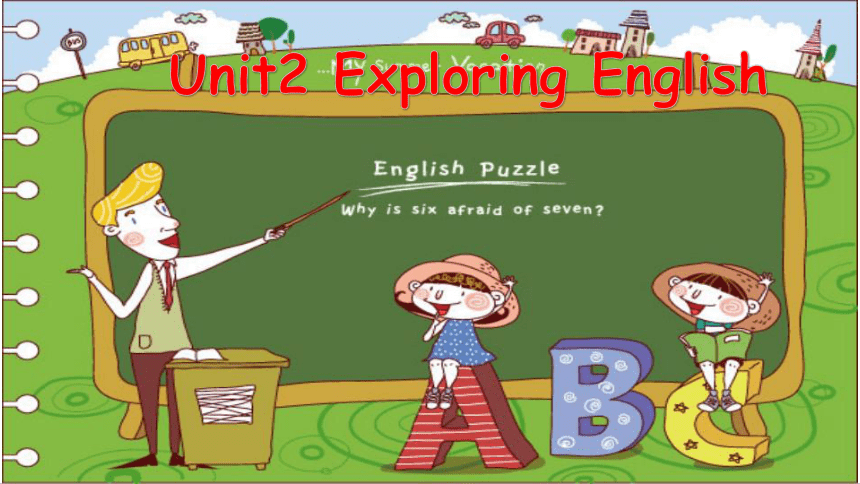
|
|
| 格式 | pptx | ||
| 文件大小 | 7.5MB | ||
| 资源类型 | 教案 | ||
| 版本资源 | 外研版(2019) | ||
| 科目 | 英语 | ||
| 更新时间 | 2022-10-11 00:00:00 | ||
图片预览

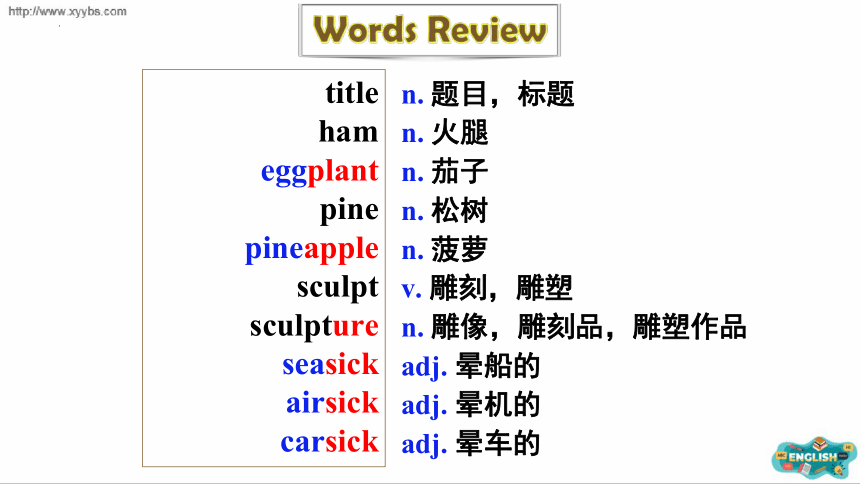
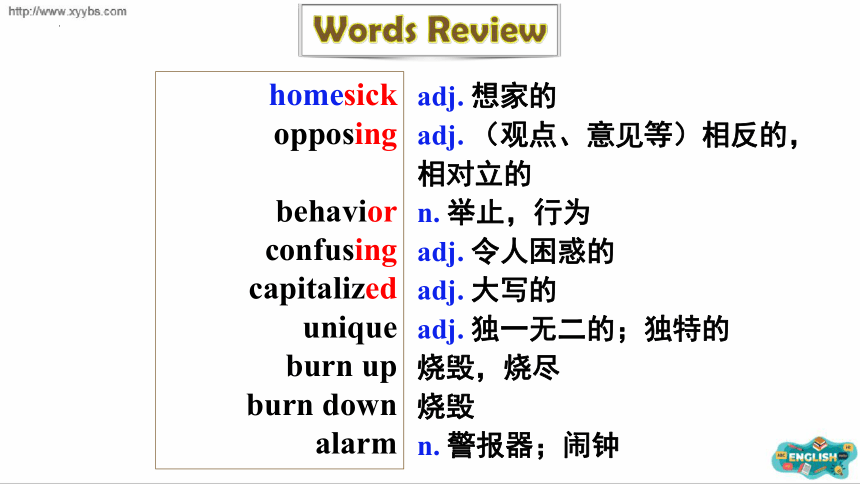
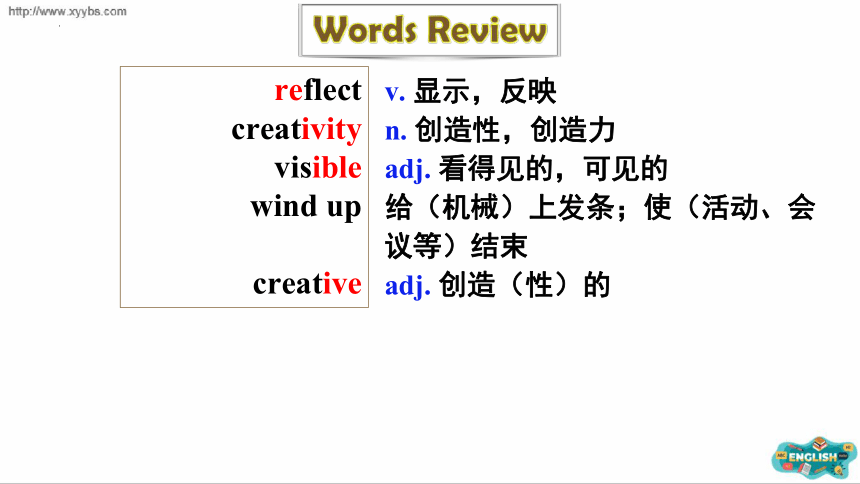
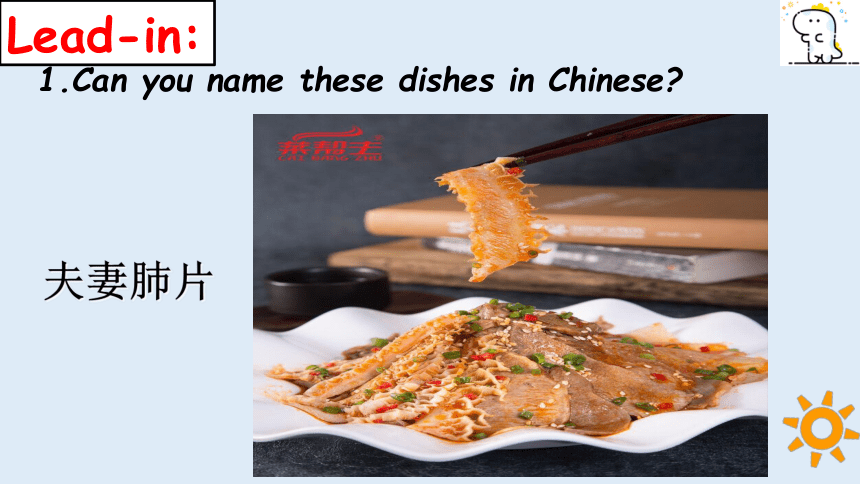
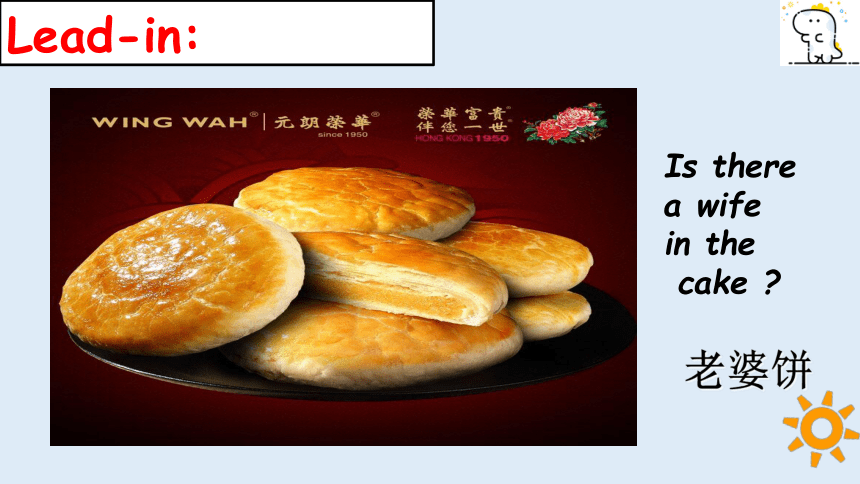
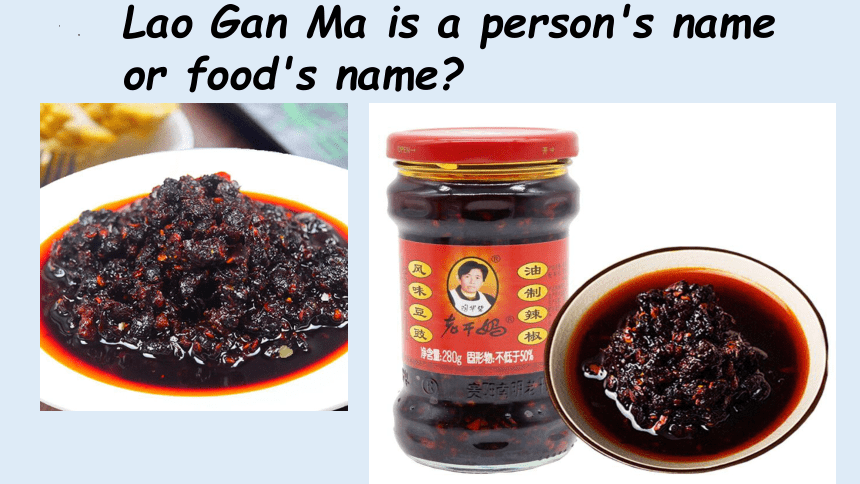
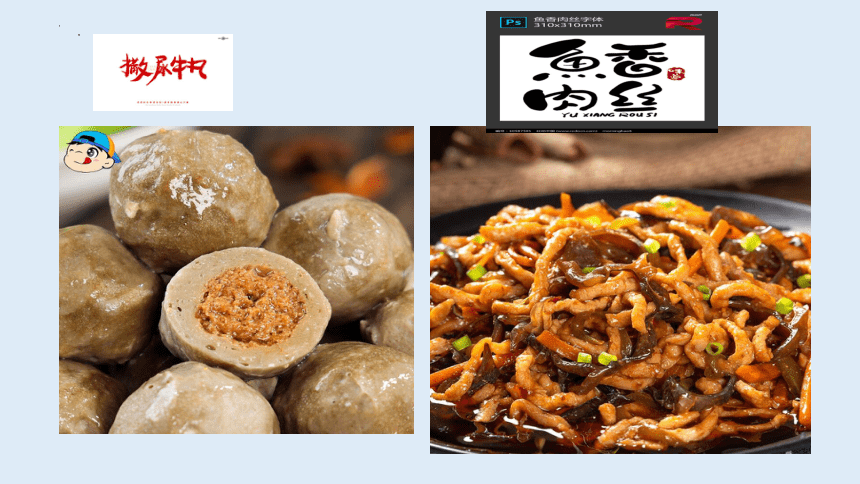
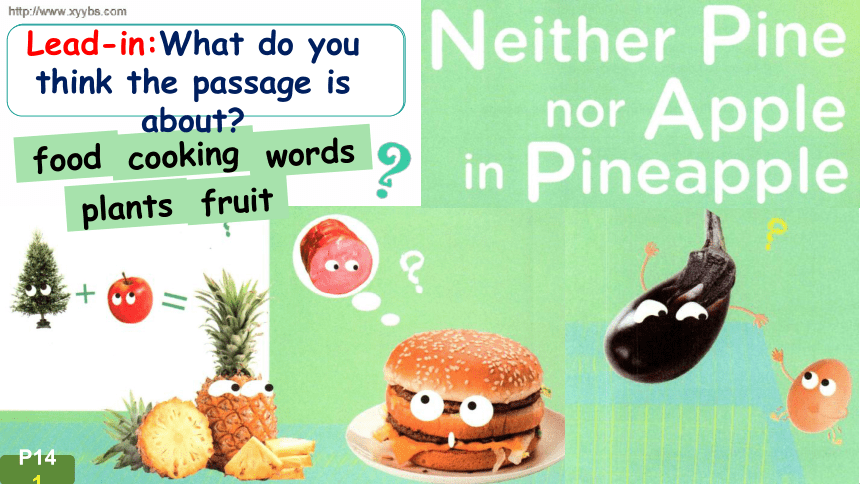
文档简介
(共27张PPT)
Unit2 Exploring English
title
ham
eggplant
pine
pineapple
sculpt
sculpture
seasick
airsick
carsick
n. 题目,标题
n. 火腿
n. 茄子
n. 松树
n. 菠萝
v. 雕刻,雕塑
n. 雕像,雕刻品,雕塑作品
adj. 晕船的
adj. 晕机的
adj. 晕车的
homesick
opposing
behavior
confusing
capitalized
unique
burn up
burn down
alarm
adj. 想家的
adj. (观点、意见等)相反的,相对立的
n. 举止,行为
adj. 令人困惑的
adj. 大写的
adj. 独一无二的;独特的
烧毁,烧尽
烧毁
n. 警报器;闹钟
reflect
creativity
visible
wind up
creative
v. 显示,反映
n. 创造性,创造力
adj. 看得见的,可见的
给(机械)上发条;使(活动、会议等)结束
adj. 创造(性)的
Lead-in:
1.Can you name these dishes in Chinese
夫妻肺片
Lead-in:
Is there
a wife
in the
cake
老婆饼
Lao Gan Ma is a person's name or food's name
Look at the title of the passage and the pictures.
food
cooking
Lead-in:What do you think the passage is about
words
plants
fruit
P14 1
Read the passage and check your answer.
Task 1
What is the passage about
food
cooking
plants
fruit
words
Tips for skimming——For General Main Idea
Focus on key words & topic sentences
Choose the author's purpose in writing the passage.
Task 2
1. To tell us that English is very difficult to learn.
2. To give advice on how to learn English.
3. To show that English is interesting and creative.
4. To explain how English was created.
Can you find some examples in the passage
Divide the passage into three parts, and find the
main idea of each part.
Task 3
Neither Pine nor Apple in Pineapple
Para(s). ______
Main idea: _________________
___________________________
Part 1
Part 2
Part 3
Para(s). ______
Main idea: _________________
___________________________
___________________________
Para(s). ______
Main idea: _________________
___________________________
1
2-6
7
English is a crazy language to learn.
The author gives examples of crazy phenomena in English.
English reflects the creativity of human race.
Complete the notes with words from the passage.
Task 4
P16 4
Para. 1
no egg in eggplant
no ham in ____________
neither pine nor apple in __________
In Chinese
hamburger
pineapple
松鼠桂鱼
夫妻肺片
鱼香肉丝
蚂蚁上树
Para. 2
sculpt a sculpture
paint a(n) _________
BUT take a photo
painting
seasick → sick at sea
________ → sick in the air
________ → sick in a car
BUT __________ → sick at home
airsick
carsick
homesick
Para. 3
“Hard” is the opposite of “soft”.
“Hardly” and “softly” are not a(n) ________ pair.
“Harmless” is the opposite of “harmful”.
Shameful and shameless _________ are the same.
opposing
behaviors
Para. 4
When we see rain or snow, we can say “it's raining” or
“it's _________”.
BUT when we see sunshine, we can't say “it's __________”.
snowing
sunshining
Para. 5
“WHO” in a medical report → ______ in “Who's that ”
“IT” “US”
“who”
Para. 6
burn up → burn down
fill in a form → _______ a form
fill out
Para. 7
Stars are out. → They are visible.
Lights are out. → They are _______.
I wind up my watch. → It starts.
I wind up the passage. → It _______.
invisible
ends
In order to support his idea, the author uses many examples that show the 1______ madness of English.
The reason is that English was invented by people, and it 13_______ the creativity of the human race.
· no egg in eggplant
· no ham in
2____________
· neither pine nor
apple in
3__________
· sculpt a
sculpture
· paint a(n)
4________
· BUT take
a photo
· seasick → sick at sea
· 5_______ → sick in the
air
· 6_______→sick in a car
· BUT 7__________ →
sick at home
· “Hard” is the
opposite of “soft”.
· “Hardly” and
“softly” are not
a(n) 8_________
pair.
· “Harmless” is the
opposite of “harmful”.
· Shameful and
shameless 9________
are the same.
· burn up →
burn down
· fill in a form →
10_______ a
form
· Stars are out. →
They are visible.
· Lights are out.
→ They are
11________.
· I wind up my
watch. → It starts.
· I wind up the
passage. →
It 12_______.
unique
hamburger
pineapple
painting
airsick
carsick
homesick
opposing
behaviors
fill out
invisible
ends
reflects
Fill in the blanks and try to retell the passage Neither Pine nor Apple in Pineapple.
Task 5
P16 4
One day my five-year-old son asked me whether there was ham in a hamburger. There isn't. This made me realize that there's no egg in eggplant either. Neither is there pine nor apple in _________. This got me thinking how English can be a ______ language to learn.
For example, while we're traveling, we can get seasick at sea, _______ in the air and carsick in a car, but we don't get _________ when we get back home. And speaking of home, why aren't homework and housework the same thing If “hard” is the opposite of “soft”, why are “hardly” and “______” not an opposing pair If harmless actions are the ________ of harmful actions, why are shameless and shameful behaviors the same
Complete the summary using the information in the passage.
pineapple
crazy
airsick
homesick
softly
opposite
Task 6
When we look out of the window and see rain or snow, we can say “it's raining” or “it's snowing”. But when we see sunshine,
we can't say “it's __________”.
Even the smallest words can be _________. When you see the capitalized “WHO” in a medical report, do you read it as the “who” in “Who's that ” What about “IT” and “US”
You also have to wonder at the ______ madness of a language in which a house can burn up as it burns down.
English was invented by people, not computers and it reflects the _________ of the human race. That is why when the stars are out, they are visible, but when the lights are out, they are invisible. And that is why when I wind up my watch, it starts, but when I wind up this passage, it ends.
sunshining
confusing
unique
creativity
Discussion
1.How did pineapples, hamburgers and eggplants
get their names
2.Does Chinese have the similar situations
Give your examples.
3.Search interesting stories that happen
because of misunderstanding of Chinese
words or expressions.
Possible answer:
· The name of “pineapple” developed from the Spanish
word “pin a”, with “apple” added to show it's a kind of
fruit;
· the name of hamburger came from the idea of
“Hamburg steak”, and later people reinvented it and
called it “hamburger”;
· eggplants got the name because they used to look like
eggs.
Read the following information and answer the questions.
1. How did pineapples, hamburgers and eggplants
get their names
2. Does the information above give you a better
understanding of the passage Give your reasons.
坐在地上
坐在地下
坐在椅子上
坐在椅子下
My Example
Discuss:2.Does Chinese have the similar situations
Give your examples.
我可想死你了
你可想死我了
要你管
不要你管
完败
完胜
烟头
烟屁股
灭火
救火
开门
开心
关门
关心
甩锅
甩锅
Discussion
3.Search interesting stories that happen
because of misunderstanding of Chinese
words or expressions.
It is the creativity, craziness and
complexity that make a language
unique, interesting and enjoyable to learn.
正是这种创造力、疯狂和复杂性使一门
语言变得独特、有趣和令人愉快。
Read and Review
Unit2 Exploring English
title
ham
eggplant
pine
pineapple
sculpt
sculpture
seasick
airsick
carsick
n. 题目,标题
n. 火腿
n. 茄子
n. 松树
n. 菠萝
v. 雕刻,雕塑
n. 雕像,雕刻品,雕塑作品
adj. 晕船的
adj. 晕机的
adj. 晕车的
homesick
opposing
behavior
confusing
capitalized
unique
burn up
burn down
alarm
adj. 想家的
adj. (观点、意见等)相反的,相对立的
n. 举止,行为
adj. 令人困惑的
adj. 大写的
adj. 独一无二的;独特的
烧毁,烧尽
烧毁
n. 警报器;闹钟
reflect
creativity
visible
wind up
creative
v. 显示,反映
n. 创造性,创造力
adj. 看得见的,可见的
给(机械)上发条;使(活动、会议等)结束
adj. 创造(性)的
Lead-in:
1.Can you name these dishes in Chinese
夫妻肺片
Lead-in:
Is there
a wife
in the
cake
老婆饼
Lao Gan Ma is a person's name or food's name
Look at the title of the passage and the pictures.
food
cooking
Lead-in:What do you think the passage is about
words
plants
fruit
P14 1
Read the passage and check your answer.
Task 1
What is the passage about
food
cooking
plants
fruit
words
Tips for skimming——For General Main Idea
Focus on key words & topic sentences
Choose the author's purpose in writing the passage.
Task 2
1. To tell us that English is very difficult to learn.
2. To give advice on how to learn English.
3. To show that English is interesting and creative.
4. To explain how English was created.
Can you find some examples in the passage
Divide the passage into three parts, and find the
main idea of each part.
Task 3
Neither Pine nor Apple in Pineapple
Para(s). ______
Main idea: _________________
___________________________
Part 1
Part 2
Part 3
Para(s). ______
Main idea: _________________
___________________________
___________________________
Para(s). ______
Main idea: _________________
___________________________
1
2-6
7
English is a crazy language to learn.
The author gives examples of crazy phenomena in English.
English reflects the creativity of human race.
Complete the notes with words from the passage.
Task 4
P16 4
Para. 1
no egg in eggplant
no ham in ____________
neither pine nor apple in __________
In Chinese
hamburger
pineapple
松鼠桂鱼
夫妻肺片
鱼香肉丝
蚂蚁上树
Para. 2
sculpt a sculpture
paint a(n) _________
BUT take a photo
painting
seasick → sick at sea
________ → sick in the air
________ → sick in a car
BUT __________ → sick at home
airsick
carsick
homesick
Para. 3
“Hard” is the opposite of “soft”.
“Hardly” and “softly” are not a(n) ________ pair.
“Harmless” is the opposite of “harmful”.
Shameful and shameless _________ are the same.
opposing
behaviors
Para. 4
When we see rain or snow, we can say “it's raining” or
“it's _________”.
BUT when we see sunshine, we can't say “it's __________”.
snowing
sunshining
Para. 5
“WHO” in a medical report → ______ in “Who's that ”
“IT” “US”
“who”
Para. 6
burn up → burn down
fill in a form → _______ a form
fill out
Para. 7
Stars are out. → They are visible.
Lights are out. → They are _______.
I wind up my watch. → It starts.
I wind up the passage. → It _______.
invisible
ends
In order to support his idea, the author uses many examples that show the 1______ madness of English.
The reason is that English was invented by people, and it 13_______ the creativity of the human race.
· no egg in eggplant
· no ham in
2____________
· neither pine nor
apple in
3__________
· sculpt a
sculpture
· paint a(n)
4________
· BUT take
a photo
· seasick → sick at sea
· 5_______ → sick in the
air
· 6_______→sick in a car
· BUT 7__________ →
sick at home
· “Hard” is the
opposite of “soft”.
· “Hardly” and
“softly” are not
a(n) 8_________
pair.
· “Harmless” is the
opposite of “harmful”.
· Shameful and
shameless 9________
are the same.
· burn up →
burn down
· fill in a form →
10_______ a
form
· Stars are out. →
They are visible.
· Lights are out.
→ They are
11________.
· I wind up my
watch. → It starts.
· I wind up the
passage. →
It 12_______.
unique
hamburger
pineapple
painting
airsick
carsick
homesick
opposing
behaviors
fill out
invisible
ends
reflects
Fill in the blanks and try to retell the passage Neither Pine nor Apple in Pineapple.
Task 5
P16 4
One day my five-year-old son asked me whether there was ham in a hamburger. There isn't. This made me realize that there's no egg in eggplant either. Neither is there pine nor apple in _________. This got me thinking how English can be a ______ language to learn.
For example, while we're traveling, we can get seasick at sea, _______ in the air and carsick in a car, but we don't get _________ when we get back home. And speaking of home, why aren't homework and housework the same thing If “hard” is the opposite of “soft”, why are “hardly” and “______” not an opposing pair If harmless actions are the ________ of harmful actions, why are shameless and shameful behaviors the same
Complete the summary using the information in the passage.
pineapple
crazy
airsick
homesick
softly
opposite
Task 6
When we look out of the window and see rain or snow, we can say “it's raining” or “it's snowing”. But when we see sunshine,
we can't say “it's __________”.
Even the smallest words can be _________. When you see the capitalized “WHO” in a medical report, do you read it as the “who” in “Who's that ” What about “IT” and “US”
You also have to wonder at the ______ madness of a language in which a house can burn up as it burns down.
English was invented by people, not computers and it reflects the _________ of the human race. That is why when the stars are out, they are visible, but when the lights are out, they are invisible. And that is why when I wind up my watch, it starts, but when I wind up this passage, it ends.
sunshining
confusing
unique
creativity
Discussion
1.How did pineapples, hamburgers and eggplants
get their names
2.Does Chinese have the similar situations
Give your examples.
3.Search interesting stories that happen
because of misunderstanding of Chinese
words or expressions.
Possible answer:
· The name of “pineapple” developed from the Spanish
word “pin a”, with “apple” added to show it's a kind of
fruit;
· the name of hamburger came from the idea of
“Hamburg steak”, and later people reinvented it and
called it “hamburger”;
· eggplants got the name because they used to look like
eggs.
Read the following information and answer the questions.
1. How did pineapples, hamburgers and eggplants
get their names
2. Does the information above give you a better
understanding of the passage Give your reasons.
坐在地上
坐在地下
坐在椅子上
坐在椅子下
My Example
Discuss:2.Does Chinese have the similar situations
Give your examples.
我可想死你了
你可想死我了
要你管
不要你管
完败
完胜
烟头
烟屁股
灭火
救火
开门
开心
关门
关心
甩锅
甩锅
Discussion
3.Search interesting stories that happen
because of misunderstanding of Chinese
words or expressions.
It is the creativity, craziness and
complexity that make a language
unique, interesting and enjoyable to learn.
正是这种创造力、疯狂和复杂性使一门
语言变得独特、有趣和令人愉快。
Read and Review
